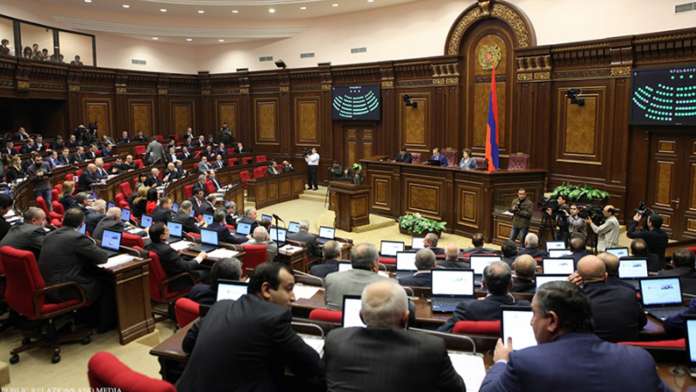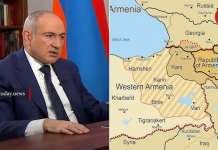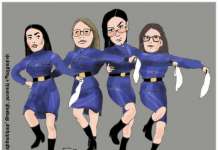YEREVAN, February 27 – Armenians will be heading to the polls on the 2nd of April to vote in the first parliamentary election since last year’s controversial constitutional referendum. This reform package is set to transform the country from a semi-presidential system to a parliamentary republic. The National Assembly will gain increased executive powers, while the President will be relegated to a largely ceremonial role.
New political alliances and old faces
This newfound importance of Parliament has already shaken the political status quo. New and old parties have scrambled to realign themselves in preparation of the vote. In total, five political parties, and four ‘blocs’ have submitted registration papers to the Central Election Committee (CEC) before the deadline expired. The campaign is set to officially kick off on March 5.
Amongst the newly created political alliances is the “Elq” (or Exit) Bloc. This grouping gathers the newly-created Light Armenia, and Civil Contract parties with the smaller Republic party into a broadly pro-European and liberal coalition. The human rights lawyer Edmon Marukyan will lead the party list.
The Heritage Party surprisingly declined to join this coalition despite its ‘liberal’ credentials. Its leader, Raffi Hovhannisian opted instead to join forces with fellow former foreign minister Vartan Oskanian and the newly dismissed Defence Minister Seyran Ohanian to form the “Ohanian-Raffi-Oskanian” bloc. This controversial decision has caused further tension within Heritage’s already embittered leadership, as many rank-and-file members accuse Ohanian and Oskanian of complicity in the deaths of 10 protesters on march 1st 2008.
Another recognisable face of Armenian politics has also signalled his intention to run. Levon Ter-Petrosyan, the septuagenarian leader of the Armenian National Congress (ANC), (and first president of Armenia) has announced a joint ticket with Stepan Demirchyan, the son of a soviet-era Armenian leader, Karen Demirchyan.
Curiously, billionaire politician Gagik Tsarukyan, who had been forced to resign from his party after a public confrontation with President Serj Sargsyan two years ago, made headlines in January when he announced his return to active politics. The tycoon, whose party had been in alliance with the current government since 2007, claimed that he could “no longer sit idly by as the people suffered”. This motivation may seem shallow considering the scornful names attached to his cause. The list includes the disgraced former mayor of Gyumri, Vartan Ghukasyan, and former Prime Minister, Hovik Abrahamyan.
The governing Republican Party has fielded a number of fresh faces on its electoral list, which curiously doesn’t include Prime Minister Karapetyan. Tashnagsutyun, despite being a junior partner, will contest the election separately, along with the Armenian Revival and Communist parties.
Backdrop of social unrest and promises for change
This election takes place in the context of mounting frustration with the government’s perceived failure to implement meaningful socio-economic reforms amidst unimpressive economic indicators. Despite governing since 1999, and repeated promises by President Sargsyan to clamp down on corruption and attract foreign investment, the Republicans have made little tangible progress.
The country has witnessed a steady growth of civic activism over recent years. Protests over environmental concerns and lack of government transparency have culminated into the #ElectricYerevan protests. Tens of thousands of citizens managed to paralyse the capital city until their demands were met in 2015. Authorities were also faced with the darker side of frustration last summer when thousands came out in support of assailants during a bloody hostage crisis.
In an attempt to quell grievances, the President appointed the former Gazprom Armenia chief, Karen Karapetyan as Prime Minister, along with a new cabinet last September. Though Karapetyan has received praise for his actions during his short time in office, critics remain unconvinced that these changes are part of meaningful reforms, rather than a last-ditch attempt to gain support in the run up to this critical election. The fact that Karapetyan’s eligibility for office is still in question has already become a point of contention. Disaffected voters have been trickling towards alternative voices like Nikol Pashinyan and Edmon Marukyan.
Electoral observers and new technology
A landmark deal between the government and the opposition promises to strengthen the democratic process. The reform plan, set to “substantially” reduce voting irregularities, will do away with voter list publications . It calls for the live-broadcasting of ballot counting across all polling stations, the extension of appeal deadlines and the introduction of electronic voting. The United States and the European Union have both pledged financial support.
Watchdogs have called for six thousand independent observers to monitor the voting process across Armenia’s 2000 polling stations come voting day. Observation missions have proven to be instrumental in fraud prevention in the past. With recent monitoring experience under their belt, independent observers from Armenia and the Diaspora have begun coordinating their efforts to clamp down on any vote rigging this April. These independent observers will be joined by 14 election experts as well as hundreds of trained monitors provided by the Organisation for Security and Cooperation in Europe (OSCE).
—
With both the Armenian government and the European Union calling for clean and free elections this April, the authorities commitment to effective electoral reform remains to be seen. In the meantime, prominent celebrities in the Diaspora, including Serj Tankian have already answered the call for election observers. In Depth coverage of the election will follow. Raffi Elloitt












